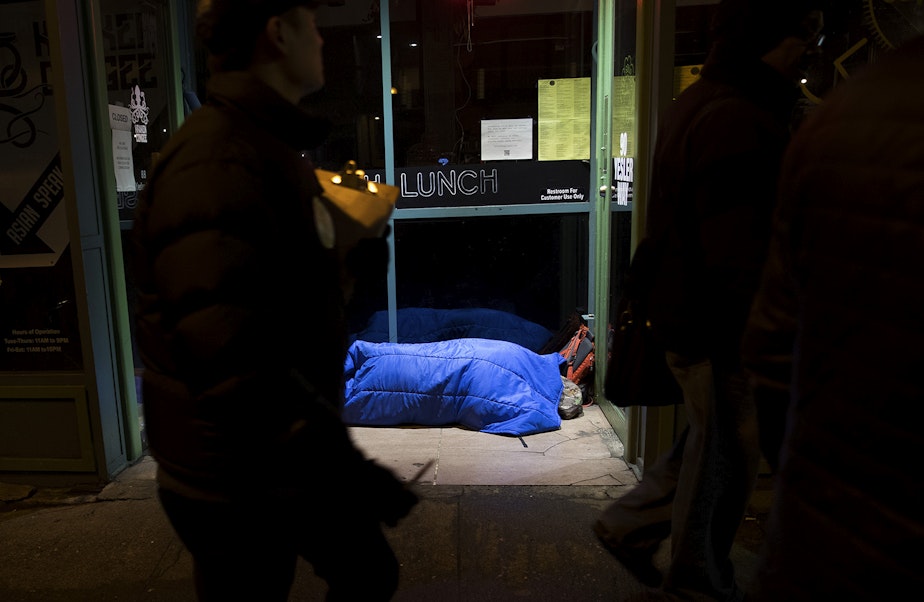Does everyone deserve to live in Seattle? Because that's what we're talking about

Is Seattle the sort of place where, if you can’t afford it, there’s no room for you?
This was the question that Jacob Vigdor, a professor of public policy at the University of Washington, posed this week. “It’s not an economics question; it’s a question of morality,” he said.
Vigdor was referring to the head tax that has divided our city. Seattle Mayor Jenny Durkan proposed the tax — $500 per employee – as a way to raise money to pay for emergency shelter and affordable housing. Real estate and rent in Seattle have skyrocketed alongside Amazon, and the feeling among city lawmakers was that Amazon should help the city.
Amazon didn't feel the same way, nor did other large companies. They threatened to pause growth.
Durkan offered a compromise on Thursday night -- $250/employee, down from $500/employee – but Seattle City Council members balked. In any case, it’s all coming to a vote on Monday.
People who like the head tax often call it progressive, because it appears to target corporations and leave poor people alone.
But Vigdor, the UW professor, says the companies will just pass the tax on to employees or shift jobs elsewhere.
“If you’re looking for the most progressive tax of them all that a city can use in Washington state, it’s actually the property tax,” he said. “Every time I say this, people say that their heads explode.”
At a city council meeting held at a church in Ballard last week, residents questioned whether the city could manage any amount they collected. They also said they were tired of paying property taxes.
“Prove to us you can responsibly spend the tax money you already have from us before you try to tax us again,” someone hollered at the table of council members.
How much money is even needed? Said Councilmember Mike O’Brien, who represents Ballard: “I firmly believe that we cannot solve this without additional revenue.”
Durkan wanted to raise $75 million with her proposed head tax. And at the county level, a consultant recently said that it would take $400 million.
And then at the Ballard meeting, $5 billion was suggested. The audience roared its disapproval.
The divide in this city extends to whether businesses should shoulder that cost, however much it is.
Summer Stinson, a Seattle resident, said at a council meeting this week: “I support the head tax because Seattle must care for our homeless and stop putting all of our tax burden on the poor and middle class.”
Amazon put the brakes on 7,000 jobs and said it is looking at property on the Eastside.Zillow talked about moving jobs to Phoenix or Denver.
And a man at the Ballard meeting said smaller companies are thinking about big changes: “In the small business community that’s pretty much the talk – get the hell out of Seattle. It’s way too expensive. Maybe even out of the state!”
There’s disagreement about whether these threats are so terrible. Some say maybe a breather from our crazy job growth wouldn't be so bad. It could give us time to build places to live. Maybe the economy can just...level off without going bust.
Howard Gleckman, senior fellow at the Tax Policy Center in Washington, D.C., a nonpartisan think tank, says it's not so simple.
“It may be that some people think they can hit the sweet spot here,” Gleckman said. “But don’t think that just because the economy’s strong and vibrant now, that it’s always going to be that way.”
He doesn’t like the head tax, because it targets job growth. He proposes a a straight-up tax on wages – applied to all businesses.
“Spread it out as much as you can,” he said. “Instead of taxing 500 companies at an average of $500 a worker, maybe you tax all the companies in the city at an average of $100 a worker.“
So policy experts don’t like the head tax and they disagree on what kind of tax would be better.
But here's the catch: Vigdor, the UW professor, says it could be that we are arguing over the wrong thing.
Consider that it is still illegal to build apartment buildings over 76 percent of Seattle’s land area, according to the latest calculation.
And that problem will still be there whether we have a head tax or not.
Correction 5/14/2018: Summer Stinson's name was corrected.
